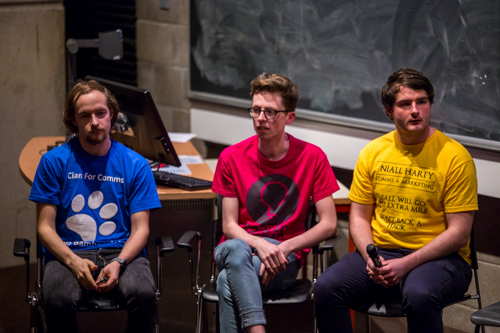Thursday’s activist hustings may have disappointed in terms of drama, but it saw a new series of questions asked to the candidates vying for the position of Communications and Marketing officer, as College commercialisation became a key subject of conversation for the first time.
Their answers spoke to a race in which candidates’ differences have been the most noticeable of the TCDSU elections.
At the hustings, a general question on the issue quickly established the differing outlooks of candidates Niall Harty, Paraic McLean and Cian Rynne. McLean’s line on the issue was striking for its pragmatism, as he suggested that “commercialisation is a good thing, but only with the research”. It does, however, make sense: as the candidate with the most direct experience in the union, McLean’s insistence on the importance of commercial revenue was telling but unsurprising. Rynne, on the other hand, said he “abhorred” the prospect. Harty meanwhile found a middle ground, proposing that commercialisation should be kept to a minimum, but represents an opportunity to tackle the growing deficit within the students’ union.
Harty’s stance is the most curious. For most of the race, he’s trumpeted his private sector experience and previous deals with Russian oligarch Roman Abramovich, but has also been quick to repudiate unethical deals and even his own former experience. Abramovich, Harty told Trinity FM on Thursday, is a “crook”.
Ahead of the race, casual observers might have thought the candidates’ niches were apparent: McLean as the more typical union candidate, Harty as the outsider and Rynne as the joke candidate.
Yet, over the course of last week, a different narrative emerged. McClean has, admittedly, done a good job of promoting his union experience and refusing, in the face of his competitors’ criticism of so-called “hacks”, to follow the temptation of distancing himself from TCDSU. On the other hand, Harty’s “don’t back a hack” approach has been undercut by a Rynne campaign that combined a droll sense of humour with a more persuasive claim to the tag of “outsider”. Even at The University Times hustings, Harty turned down an opportunity to criticise either the current Communications and Marketing Officer or the campaigns of his competitors. Tellingly, Rynne was happy to exploit the opportunity – picking apart his opponents’ deficiencies and promoting his platform of attractively simple ideas.
It’s perhaps unsurprising the way the race has turned out. In his manifesto, Rynne promises to “digitalise the students’ union diary”, a difficult task but by no means impossible. McLean, again pragmatic in approach, offered incremental changes that would enhance, if not revolutionise, the union. Harty promised something of an unorthodox array of points, including social media takeovers by societies, daily student takeovers and “fonts for the dyslexics”, wording for which he was forced to apologise on Wednesday night.
Their standpoints on commercialisation indicate not just how they would address the specific issue at hand, but also their views on what the union’s mindset should be as a whole going forward.
If differences existed already, the issue of commercialisation delineated the candidates more than any which preceded it. As they offered their varying standpoints, candidates appeared, consciously or otherwise, to be articulating the ideas which inform their vision for the union. With election day approaching, they will hope to implant these ideas into the consciousness of potential voters.
If I were to sum it all up in a phrase, it would be “don’t look away now”.







